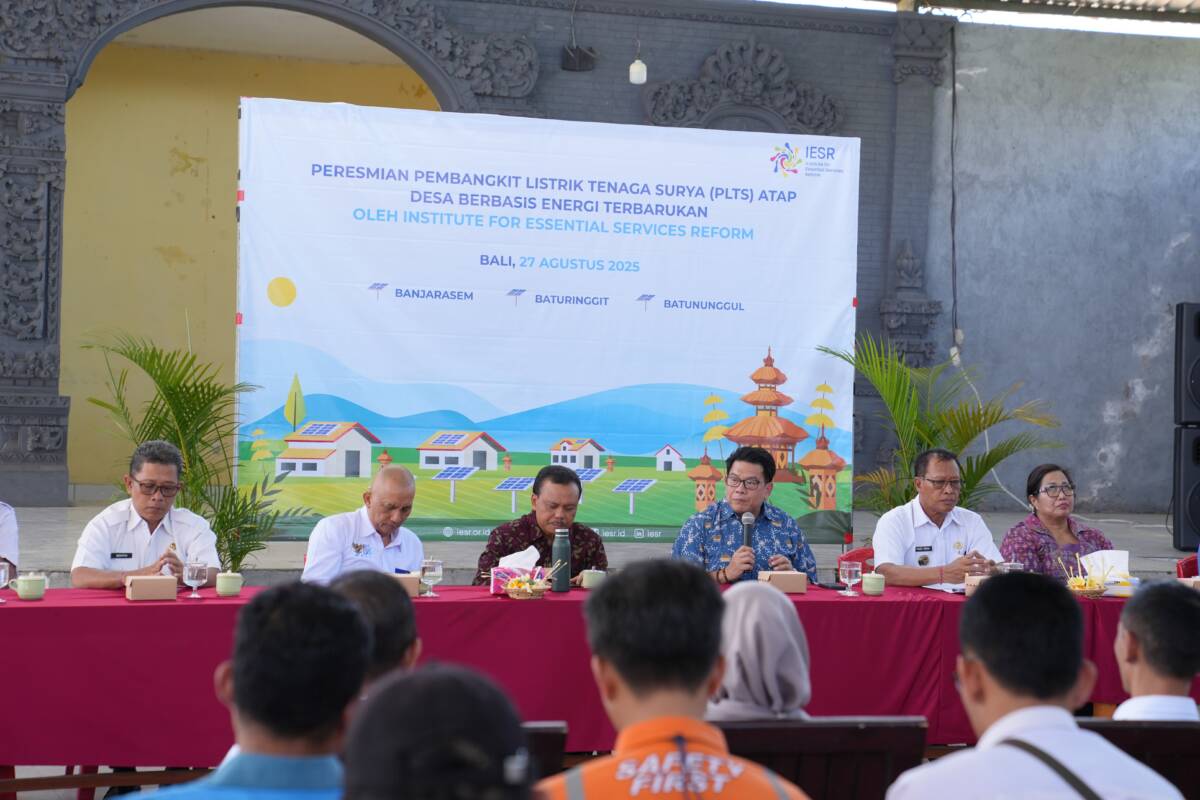Denpasar, August 27, 2025 – The Institute for Essential Services Reform (IESR), in collaboration with the Bali Provincial Government, inaugurated four solar power plant (PLTS) installations with a total capacity of 15.37 kWp across three villages. The inauguration ceremony took place on Wednesday (8/27) in Banjarasem Village, Buleleng Regency.
The four solar power systems were installed at the Banjarasem Village Head Office in Buleleng Regency (3.48 kWp with a 4.8 kWh battery) and for a water pump in Baturinggit Village, Karangasem Regency, with the same capacity. Meanwhile, Batununggul Village in Nusa Penida, Klungkung Regency, received two installations: a 5.95 kWp PLTS with a 4.8 kWh battery at the Nusa Penida Sub-District Head Office, and a 2.46 kWp PLTS with a 5.12 kWh battery at SD Negeri 1 Batununggul (State Elementary School 1). These installations are part of IESR’s Renewable Energy-Based Village initiative in Bali, aligned with the Bali Net Zero Emission (NZE) 2045 framework.
According to IESR’s analysis, Bali has a solar energy potential of up to 22 GW, yet its current utilization is less than one percent. Utilizing solar energy in villages for community activities and public services is a crucial first step towards achieving Bali’s energy independence and empowering communities in the energy transition, starting at the village level.
IESR Chief Executive Officer (CEO), Fabby Tumiwa, stated that IESR has been initiating the Renewable Energy-Based Village program since 2025 as part of the Bali NZE 2045 initiative. Since June 2025, IESR has provided support in the three villages of Baturinggit, Banjarasem, and Batununggul. As of August 2025, with the support of village governments, Village-Owned Enterprises (BUMDes), active community participation, and the Bali Provincial Manpower and ESDM Office, they have successfully conducted socialization, training, and the installation of solar power plants. Three PLTS systems have been operational since July 2025, while the PLTS and Battery Energy Storage System (BESS) at the Nusa Penida Sub-District Office are planned to be fully operational in September 2025.
Fabby also mentioned that the funding for the PLTS installations came from the philanthropic organization ViriyaENB, which has been supporting the Bali Net Zero Emission 2045 initiative since 2023.
“The selection of villages for this Renewable Energy-Based Village pilot project was done carefully, through a multi-indicator assessment of both traditional and official villages in Bali based on input from the local government. This selection considered the potential for renewable energy use, electricity needs for public services, economic and social benefits, and the community’s readiness to participate in managing a community-based energy system,” said Fabby.
The Regional Secretary of Bali Province, Dewa Made Indra, who attended the inauguration on behalf of the Governor, expressed appreciation for IESR’s solar power initiative. He emphasized the importance of educating the public with simple explanations, especially regarding the benefits and efficiency of PLTS. This effort will foster public interest in switching to renewable energy. Representing the Bali Provincial Government, Dewa Made Indra also highlighted the importance of replicating this initiative in various villages across Bali so that they can play an active role in achieving Bali’s energy independence.
Fabby stated that the presence of these solar power systems in the three villages can serve as a tangible example that energy needs at the village level can be met through renewable energy, in line with the Tri Hita Karana philosophy. The PLTS and batteries have been designed to meet electricity needs and provide long-term benefits for the residents. In Baturinggit Village, the PLTS supports the electricity needs of the village’s PAMSIMAS water pump, which is vital for 150 households. Its management is handled directly by BUMDes with a designated person who has received technical training for operation and maintenance. In addition to reducing electricity costs, residents can directly experience their water needs being supplied by renewable energy.
Furthermore, in Banjarasem Village, the PLTS installed at the Banjar (sub-village) and the Banjarasem Village Head Office will support public services and activities at the village hall. This system is managed by BUMDes with a trained official in charge. The presence of the PLTS will also lighten the village’s electricity bill by 50%-60%, allowing the savings to be reallocated for productive activities for the villagers.
In Nusa Penida, the installation of solar power plants at the two locations—the Sub-District Head Office and SD Negeri 1 Batununggul—will not only support the target of 100% renewable energy by 2030 but also streamline public services and teaching and learning activities. Both locations also have trained technical personnel to ensure the PLTS management is well-maintained and lasts.
“Renewable energy must be a part of village life, with its benefits felt directly, not just for electricity, but also to support a green and high-quality people’s economy and public services. This is the true face of an inclusive energy transition,” said Fabby.
IESR affirmed that this pilot project is expected to be replicated in all villages across Bali and receive support from district/city governments, the central government, and attract funding from various public and private parties.
Bali solar power, IESR, Desa Berdikari Energi, renewable energy Bali, Bali Net Zero Emission 2045, PLTS Bali, Baturinggit, Banjarasem, Batununggul, community-based energy, energy transition Indonesia, ViriyaENB, clean energy villages, Bali renewable energy potential, solar panel installation.

